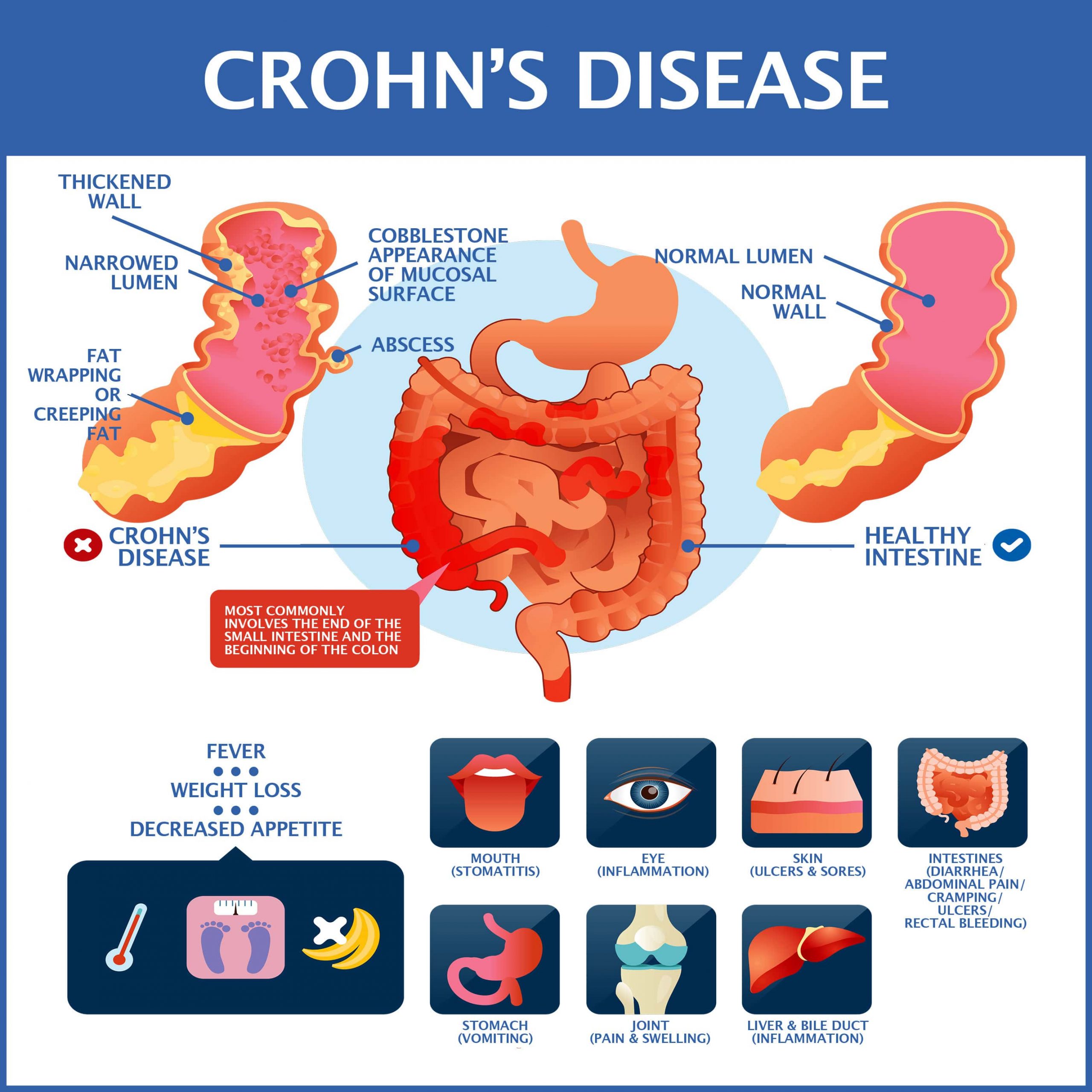
You’ve just been diagnosed with Crohn’s Disease. This realization can be frightening and cause confusion and uncertainty. By gaining the proper knowledge, you may be able to keep this illness under control and lead a relatively normal and productive life.
Inflammatory Bowel Disease
Inflammatory bowel disease, which is abbreviated as IBD, is used to describe any gastrointestinal ailment causing persistent inflammation within the digestive tract. The two most common illnesses are ulcerative colitis and Crohn’s Disease.
Crohn’s Disease Overview
This condition occurs mainly inside the small intestine and large intestine (your colon). Crohn’s Disease can appear in any other region of the digestive system, including the:
- Esophagus.
- Stomach.
- Pancreas.
- Anus.
- Liver.
You might even experience Crohn’s-related inflammation inside your mouth, eyes, and skin.
Causes
Currently, researchers have been unable to pinpoint a specific underlying cause, but there is a belief that Crohn’s Disease is brought forth by abnormalities in your immune system.
An optimally functioning immune system identifies and eliminates potentially harmful organisms like viruses, bacteria, fungi, and other foreign or suspicious materials.
When you have Crohn’s Disease, your immune system identifies harmless or even beneficial organisms like bacteria as threatening and attacks them. This results in the development and continual progression of moderate to severe inflammation.
Risk Factors
Scientists believe that several risk factors heighten your chances of contracting Crohn’s Disease including:
- Age – Crohn’s Disease can strike at any age. But it is usually diagnosed in young people and adults under age 35.
- Genetics – The disease often impacts consecutive familial generations. Researchers have discovered that anywhere from five to 20 percent of all persons diagnosed with Crohn’s Disease possessed a first-degree relative, including a sibling, parent, or child who has the illness.
- Specific Ethnic Backgrounds – Investigating scientists have also concluded that certain ethnic groups are more prone to the ailment. If you are of Eastern European, Jewish, or African ancestry, your chances of developing the disease increase.
- Environmental Factors – Hailing from a developed nation, northern climate, and urban center is also said to increase your chances.
- Gender Equality – Men and women appear to contract the disease somewhat equally.
- Lifestyle Issues – Researchers believe that stress and diet play a role in the condition’s development but are not considered a direct factor.

Physical Symptoms
Crohn’s Disease is not a one-size-fits-all illness. You may experience different disease progression and symptoms that others do not.
For example, your illness might be specifically confined to the colon. In other instances, Crohn’s Disease might impact only certain segments of your intestines. In the most severe cases, inflammation can affect your entire digestive tract.
It is difficult to predict how the disease will strike. You may witness a gradual onset of symptoms. In some cases, such events could occur intensely. Common symptoms include:
- Diarrhea.
- Fatigue.
- Blood and pus-tinged stools.
- Abdominal pain.
- Unintentional weight drop.
- Oral cavity sores.
- Appetite loss.
- Elevated body temperature.
More significant cases might also elicit occurrences, such as liver and bile duct inflammation, the development of kidney stones, and serious systemic iron depletion. In youths, the condition can result in stunted growth, delayed sexual maturity, and slowed cognitive development.
The one thing experienced by most Crohn’s patients is abrupt occurrences and stoppages. Typically, you will experience these events, also referred to as flare-ups, that may last for several days, weeks, or months and are followed by remissions lasting for months and sometimes even years.
Possible Complications
If you fail to get symptoms under control, Crohn’s Disease can precipitate a host of negative and potentially life-limiting complications such as:
- Abscesses – When inflammation protrudes through intestinal walls, pockets of pus known as abscesses can form. The anomalies contain large concentrations of bacteria and can lead to systemic infections if not promptly remediated.
- Nutritional Deficiencies – During a flare-up, you might experience many incidents of diarrhea. When they occur, you lose significant amounts of nutrients contained in the foods you consume. Appetite loss can precipitate a diminished intake of needed vitamins and minerals.
- Dehydration – Diarrhea also results in a significant drop in your body’s water content. When this becomes severe, dehydration can set in. Moderate to severe cases of dehydration could prove life-threatening.
- Intestinal Obstruction – Progressive inflammation can thicken intestinal walls. Eventually, this can result in abnormal narrowing that interferes with the optimal flow of food, digestive juices, waste products, and other pertinent bodily substances.
- Colon Cancer – Long-term Crohn’s Disease may increase your risk of developing colon cancer.
Diagnosis
Unfortunately, there is no single test or standard procedure doctors use to diagnose Crohn’s Disease. Diagnosis might take some time and need many investigatory efforts.
To ultimately confirm the condition, your doctor might perform:
- Blood Tests – You may undergo blood examinations searching for anemia, which is a low red blood cell count. Anemia may suggest that you are bleeding internally or have a dangerously low systemic concentration of iron. Both conditions could be symptoms of Crohn’s Disease.
- Stool Samples – Doctors may take a sample of your stool to examine it for blood.
- Internal Imaging Apparatuses – Tools like magnetic resonance imaging, computerized tomography, colonoscopy, capsule endoscopy, and balloon-assisted enteroscopy enable doctors to capture internal images of your digestive system and identify symptomatic features, like scarring, structural malformation, inflammation, ulcers, and bleeding.
Once you are firmly diagnosed, your doctor’s focus will shift towards prescribing the most appropriate treatment.

Potential Treatment Options
It is important to stress that, presently, Crohn’s Disease has no known cure. The condition can be controlled using one or a combination of relatively effective treatments, including:
Lifestyle Changes – Occasionally, lifestyle amendments can prevent or delay a flare-up’s onset. Nutritionists and healthcare providers maintain that your best bet is to consume soft and bland but nutrient-laden foods. Spicy, processed, and fiber-rich products could exacerbate symptoms and worsen systemic inflammation.
You are urged to limit stress. Tension has a negative influence over your digestive tract. Eliminating stress is not always easy or manageable. Any unnecessary avenues of stress should be avoided. Additionally, you should identify and try relaxing activities or practice breathing or calming techniques.
Medications – Your doctor might prescribe over-the-counter or prescription drugs designed to counter specific untoward symptoms like diarrhea, cramping, and fever. They might put you on a course of immune system suppressing preparations. These medications can prevent or curtail the immune responses that trigger flare-ups.
Drugs – Researchers are looking for new ways to treat symptoms of Crohn’s disease symptoms, as well as possible cures. Newer treatments are using medications that block inflammation at the source rather than after the inflammation has occurred. These include biologics, steroids, antibiotics, selective inhibitors, immune system suppressors, and anti-inflammatory drugs.
Surgery – When complications like extreme inflammation or bowel obstruction occur, surgery may be needed. Typically, surgical interventions are undertaken to remove badly diseased tissues and eliminate blockages capable of impeding waste elimination and other crucial systemic processes.
Physicians know that everyone is different. What helps one patient might not work on another. Treatment often involves some degree of trial and error and employing several remedial regiments at once.
Contact Us
Our practice began more than 15 years ago and has emerged as one of the leading gastroenterology practices in central Florida. We perform a host of diagnostic procedures using state-of-the-art equipment in a friendly, comfortable, and inviting atmosphere where patient care is always a top priority. Contact us today!